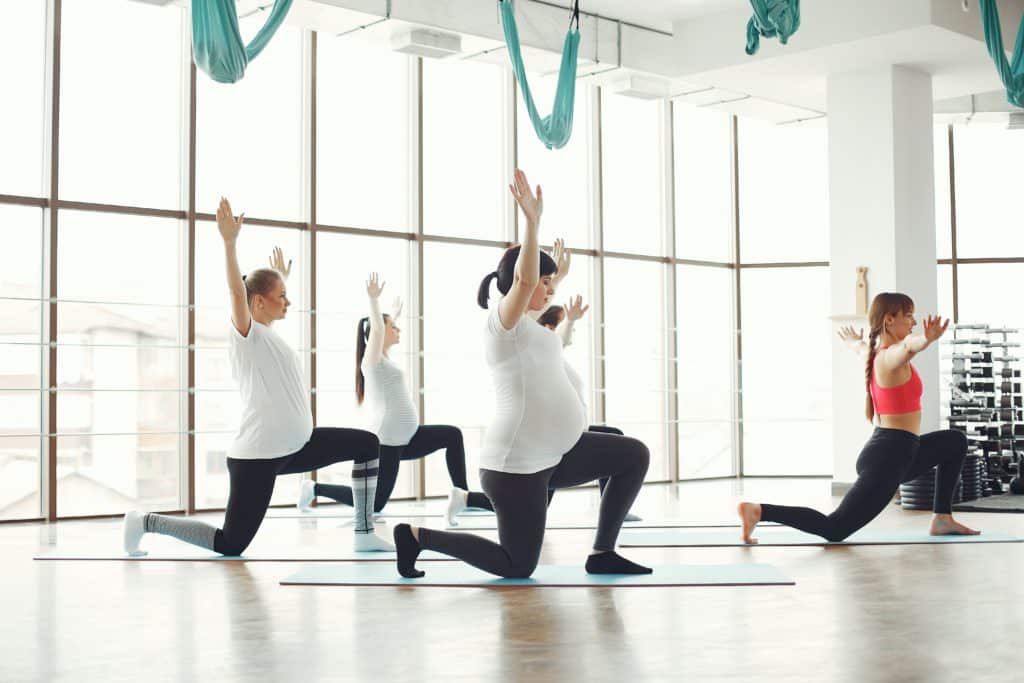During pregnancy, it is important to stay as active, healthy and calm as possible to benefit the mother and the fetus. Prenatal yoga can help you accomplish all of that. Prenatal yoga is yoga that is done during pregnancy. It is said maybe to be just the ideal exercise for pregnant women.

This is because it is a type of yoga tailored to help reduce stress, keep you active, and prepare your body and mind for childbirth while still being safe.
The Benefits of Prenatal Yoga
Remaining active is a great way to stay healthy during pregnancy. A lot of expecting mothers have found prenatal yoga to be a great deal of help to them and you could be one of them too. Some possible benefits of prenatal yoga include:
- decreasing stress and anxiety which can, in turn, help to lower the risk of high blood pressure.
- improving your delivery experience as it provides the opportunity to practise calming childbirth breathing and relaxation techniques that can help throughout the childbearing process.
- reducing the discomfort associated with pregnancy, including nausea, headaches, and backaches.
- improving sleep quality during pregnancy due to the increased physical and mental strain on the muscles.
- boosting your mental health. Prenatal yoga can help the soon-to-be mother to manage the stress of pregnancy and symptoms of depression and anxiety.
- creating a network of support. Expectant parents can meet and build relationships with one another at prenatal yoga programs. This can create a strong support system that makes childbirth and postpartum easier.

What Should You Expect In A Prenatal Yoga Class?
Before you decide to attend a prenatal yoga class, you must check with your doctor first. If you are then given the go-ahead, these are some things you should expect in one of these classes:
- A brief introduction during which your prenatal yoga instructor will ask you a few standard questions. Such as your name, the stage of your pregnancy, whether you are experiencing any aches or pains, and which area of your body you would like to focus on. Additionally, they might ask you about your preferred poses, so don’t be afraid to speak freely. Your safety and comfort are most important.
- A brief moment of relaxation. And then a quick warm-up that you would typically perform before each workout.
- Practice breathing exercises and techniques, which can help you manage your breathing during labour.
- Some mild stretches.
- Prenatal yoga poses that are safe for pregnancy. You will get to practice suitable postures for your body that can help strengthen the muscles you’ll need for childbirth.
Best Prenatal Yoga Exercises For Expecting Mothers
There are various prenatal yoga poses out there. However, some of the most common ones for pregnant women include:
- Cat/Cow Stretch: Helps ease pain in the shoulders, back, hips, and neck.
- Standing Backbend: Minimises the forward bending that arises from the growth of your uterus during pregnancy.
- Child Pose: Great for releasing pressure from your tummy.
- Downward-Facing Dog: A great stretch for the entire back of the body, from head to toe.
- Abdominal Stretch: A simple and safe technique to stretch the lower back while supporting the weight of the upper body.
- Butterfly Pose: Reduced pain by opening the hips and increasing the flexibility of the inner thighs and groin.

Safety Guidelines And Considerations
While prenatal yoga might be an ideal form of exercise for pregnant women, it is still important to remember to be as safe when exercising while pregnant. So make sure to talk to your healthcare provider before you start taking these yoga classes.
If you start experiencing difficulties like headaches, breathing difficulties, chest pain, dizziness or swelling, stop and contact your doctor immediately. Stay well-hydrated by drinking enough water while you exercise and remember not to push yourself too hard. It is perfectly fine to take things slow and easy.
Avoid hot yoga completely and avoid lying flat on your back as this could interfere with circulation and make you feel dizzy and nauseous. You should also steer clear of deep backward or forward bends, inverted poses like headstands and deep abdominal stretches. You can find helpful suggestions on safe and effective abdominal exercises during pregnancy here.
Making sure your yoga instructor is qualified is a very important precaution. To ensure that you are in the safest hands, it is essential to find a class that is taught by an instructor who has had prenatal yoga training.

